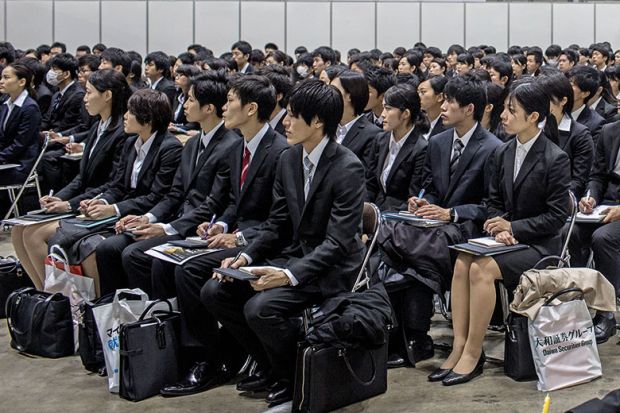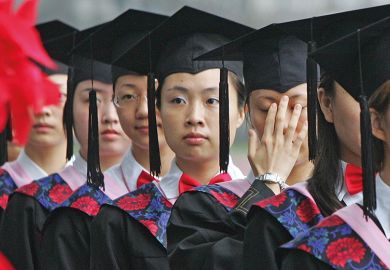The choreographed mass hiring of Japanese university students may be a thing of the past after the country’s most powerful business lobby questioned the ground rules that have guided graduate recruitment for decades.
The chair of the Japan Business Federation, or Keidanren, has proposed scrapping the “Guideline on Recruitment and Selection” – the latest version of the directives that have prescribed company hiring practices since 1953.
Keidanren chief Hiroaki Nakanishi, who is also chair of electronics giant Hitachi, told a press conference that it was not the federation’s job to “oversee hiring schedules”.
“The very basics of employment in Japan, such as lifetime employment, are no longer sustainable,” he said, according to the Asahi Shimbun newspaper. “It does not make sense to expect companies to hire people en masse.”
Hiring season has long been a unique feature of Japanese university life. Each April, students entering their fourth undergraduate year start polishing up their CVs and researching possible employers.
In autumn or early winter, companies stage career fairs and sign up thousands of future graduates for jobs beginning the following April. Some 90 per cent of graduates launch their careers in this way.
Students who have worn mufti for the past three years arrive in class wearing black suits and awaiting calls from would-be bosses. But in recent years, the career conveyor belt has been disrupted by a decline in the working-age population that has left Japan with an unemployment rate of just 2.5 per cent and about 1.6 jobs for each applicant.
Eager to snap up the smartest youngsters, some companies – particularly those that are not Keidanren members – have started recruiting students when they are still in third year. Keidanren reacted by moving the hiring season forward to June, forcing students to don their suits in Japan’s sweltering summer.
After complaints by universities and the government, Keidanren instructed its members not to hold public relations events or recruitment seminars before March, and to hold off interviews and other selection processes until at least June. But non-members – and some members – have ignored the directives.
Complicating matters, the corporate spaces normally used for career fairs are now being booked out for the 2020 Tokyo Olympic Games. “Everyone knew there was going to be a 2020 problem,” said Chris Pokarier, a professor of business and governance at Waseda University in Tokyo.
He said that the coming Olympics had “killed” the recruitment model, forcing companies to make up their own minds about when to hire staff. “Who knows what’s going to happen now? Probably it will be a free-for-all, and the companies will recruit earlier than ever.”
Professor Pokarier said that there would be unprecedented disruption of Japanese university classes as a result. But he said that some companies had already been experimenting with alternatives to the “insane deluge of graduates” that forced them to maintain massive human resources teams for a single annual intake.
Reaction to Mr Nakanishi’s proposal has been mixed. The Federation of Japanese Private Colleges and Universities Associations wants to maintain the current hiring schedule, according to the Japan Times.
But Cabinet members have expressed support. “It is worth thinking about,” said Taro Aso, the finance minister.
Prime minister Shinzō Abe, however, warned against wholesale early recruitment. “It’s wrong that job hunting comes before studying, which is the prime duty of students,” he said
Register to continue
Why register?
- Registration is free and only takes a moment
- Once registered, you can read 3 articles a month
- Sign up for our newsletter
Subscribe
Or subscribe for unlimited access to:
- Unlimited access to news, views, insights & reviews
- Digital editions
- Digital access to THE’s university and college rankings analysis
Already registered or a current subscriber?








